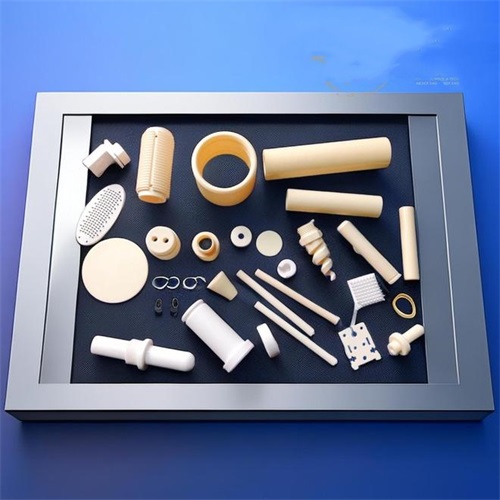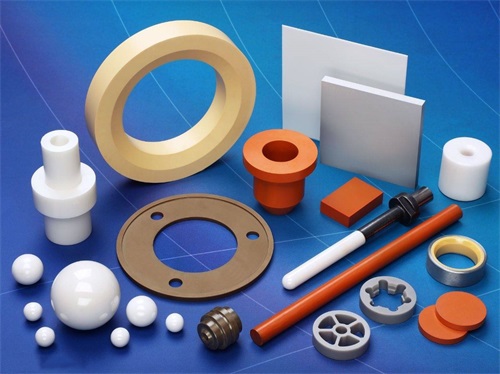What are the characteristics of Macor’s machinable glass ceramics
Macor processable glass ceramic is a unique microcrystalline glass ceramic material developed by Corning Incorporated in the United States, which combines the dual characteristics of glass and ceramic. It not only has the advantages of high strength, high temperature resistance, and corrosion resistance of traditional ceramics, but also has the uniformity and processability of glass, making it an engineering material with excellent comprehensive performance.

- Excellent processability
The most prominent feature of Macor ceramics is its excellent machinability. It can be processed using traditional metal processing tools such as lathes, milling machines, drills, grinders, etc., without the need for special equipment or technology. This material can be processed into complex shapes and precise dimensions, with a processing accuracy of ± 0.0005 inches (approximately 0.013 millimeters) and a surface finish that can be polished to 0.5 microinches (approximately 0.013 micrometers). This processability greatly reduces the production cost and processing time of complex components. - Excellent high temperature resistance performance
Macor ceramics can maintain stability in high temperature environments. It can work continuously at 800 ° C, with a peak temperature of up to 1000 ° C. At high temperatures, Macor ceramics do not undergo creep or deformation, and their thermal expansion coefficient is similar to many metals, allowing them to be directly welded to metals without generating thermal stress. This characteristic makes it widely used in high-temperature environments such as aerospace and nuclear industry. - Good electrical insulation
Macor ceramics are an excellent electrical insulation material with a volume resistivity of up to 10 ¹⁴ to 10 ¹⁵ ohms · cm and a dielectric loss of only 0.0002. Even in high temperature and humid environments, it can maintain good electrical insulation performance. This makes Macor ceramics perform well in electronic and electrical fields, such as semiconductor devices, high-frequency insulators, and other applications. - Excellent chemical stability
Macor ceramics have good chemical stability and can resist almost all chemical substances except hydrofluoric acid and molten alkali metals. This characteristic enables it to maintain stable structure and performance in harsh chemical environments, without failure due to corrosion. - Zero porosity
The microstructure of Macor ceramics has almost no pores and zero porosity. This characteristic not only improves its chemical corrosion resistance and electrical insulation, but also enhances its mechanical strength and thermal stability. In a vacuum environment, Macor ceramics do not release gas and are suitable for high and ultra-high vacuum environments. - Good biocompatibility
Macor ceramics have good biocompatibility, which makes them have certain potential applications in the medical field. For example, it can be used to manufacture complex structures such as artificial eyeballs, microcrystalline glass ceramic bodies, etc. - Mechanical properties
Macor ceramics have high hardness (close to high carbon steel), high strength, and wear resistance. These characteristics make it perform well in the field of mechanical manufacturing, such as manufacturing bearings, nozzles, guide rails, and other components. - Thermal stability
The thermal conductivity of Macor ceramics is around 1.3 W/m · K, which is between glass and ceramics. Its low thermal expansion coefficient enables it to maintain good dimensional stability even under temperature fluctuations. This characteristic makes it suitable for situations that require high-precision dimensional control. - Widely applicable
Due to its unique performance combination, Macor ceramics have been widely used in multiple fields. It is used in aerospace, electronics, nuclear industry, medical, mechanical manufacturing and other fields. For example, in the aerospace field, it is used to manufacture engine combustion chambers, turbine blades, optical system components, etc; In the field of electronics, it is used to manufacture semiconductor equipment components, high-frequency insulators, etc.

Macor machinable glass ceramics have become a highly valuable engineering material due to their excellent processability, high temperature resistance, electrical insulation, chemical stability, and zero porosity advantages. It can not only meet the processing requirements of complex shapes and precise dimensions, but also maintain stable performance in high temperature, vacuum, and corrosive environments.
PREVIOUS:Comparison of Properties between Aluminum Nitride Ceramics and Aluminum Oxide Ceramics
NEXT:Application of Macor Machinable Ceramics in the Field of Optical Devices
CATEGORIES
LATEST NEWS
- Zirconia Ceramic Rod Custom...
- High-temperature resistance...
- What is the wear resistance...
- What is the hardness of cer...
- Aluminum oxide ceramic cust...
- What are the main aspects o...
- What are the mechanical pro...
- Thermal properties of zirco...
- What properties should be c...
- What are the mechanical pro...
